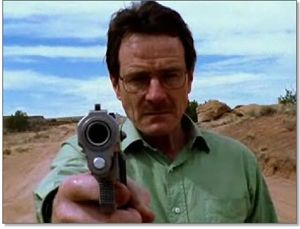While AMC's Mad Men gets most of the press, the network has another amazing show called Breaking Bad. The show's about a brilliant high school chemistry teacher that finds out he's dying. To help provide for his family after he's gone and also to pay for medical treatment, he gets into cooking crystal meth. The problem is...the guy has always been a straight shooter and completely honest, so he doesn't understand how the drug trade works. Trust me, this is a show you should be watching and the lead performance by Bryan Cranston is amazing. That's probably why he won the Emmy for Outstanding Lead Actor in a Drama Series the past two years.
With season three just starting and season two out on home video, I was able to speak with Bryan Cranston to help promote the series. During the interview we talked about what's different on season three, what making the show is really like, the amazing season two finale and the clues that led up to it, and he also talked about Andrew Stanton's John Carter of Mars and Anthony Hemingway's Red Tails. It's a fantastic interview so hit the jump to check it out:
NOTE - Spoilers from the first two seasons of Breaking Bad are discussed in the interview. Consider yourself warned.
-
Collider: So are you wrapped on the next season?
Bryan Cranston: Oh yeah. We finished all 13 episodes of season 3 the end of January.
So you are the man with the answers.
Cranston: I've got them all. I'll tell you everything you want to know.
I actually I hate spoilers, so I will not ask that question.
Cranston: All right.
But I'm sure there's a lot of fans that would love to know. First of all a huge fan of your series and a huge fan of your work on the series-the season 2 and season 1 are incredibly well received by critics and audiences. When you guys were sitting down to do season 3, did that sort of add any pressure to making the show - knowing what the critics and fans have been saying?
Cranston: I think added pressure for Vince Gilligan and the writing staff. They have the most pressure. They have to develop the whole concept of how they put themselves into a corner and how they get themselves out. And I think it's always been a very, very interesting relationship with that. I mean they truly agonize over how can we then now justifiably put him in another condition that the character's in in another environment that is equally painful and high stakes.
Well one of the things about your character in season 2 is...hopefully people reading this will know the arc, but you thought you were going to die. And then the cancer went into remission. And you discovered that normal life was sort of not what it was before. Now there's sort of that added drug of the excitement of dealing with stuff that's say against the law. How does that factor into the arc of season 3?
Cranston: Well I think it's a few things. First of all the remission, as I thought the connotation was as well, was that oh, it's improved. Your condition is improved. And remission specifically means it hasn't spread. It hasn't worsened beyond the initial diagnosis. So the diagnosis is I'm still going to die of lung cancer. It's still terminal lung cancer. Remission means it hasn't progressed rapidly. So it's still the same condition.
At the end of season 2, I mean to put it bluntly, the shit hit the fan, you know? You had a phenomenal finale. The family life is in chaos. Did we join season 3 moments after season 2 ended? And what's the immediate stuff that Walter has to deal with?
Cranston: Season 3...well let me just give you a general overview first. If season 1 was about Walter White and his decision based on a set of bizarre and unusual circumstances how he decides to become a criminal altruistically for the betterment of his family and then die. That's his general plan. Season 2 then had to explore the consequences of that decision. Going into the gray areas of the idea of self-defense and murder and being that kind of person and knowing that you have to develop a set of skills that are different from anything you've ever had before. Season 3 now explores between both Jesse and Walt-the acceptance of who you are-of the darker side of yourself, that you are capable of this. You now know the players and the rules and now it's about surviving within that construct. So the first episode of the 3rd season starts about a week and a half after the plane crash. And we realized that Walt does learn his end of it-his culpability to...the chain of events that happened that culminated in the plane crash. And he has to deal with that and he's struck by tremendous guilt, of course. And also the interesting thing that the happens in the first episode is that Skyler, who is fed up with him, makes an educated guess as to what he's doing. "How did you get so much money?", and she hits it and he can't answer her and she knows she's right. So she finds out what he's doing in the very first episode, which I think is very courageous because it really throws the whole conceit out the window that when this show first started that Walt has to keep this a secret from his family or else it's all lost. So now she does know. Now what? How does that change things? If now...talk about a tailspin. Walt and the rest of the group just start spinning out of control.
Well, that's one of the things that's actually what I find great about your show is that it's not just trying to rest on one storyline, that season 1 and season 2 have explored so many different things. But one of the things that I really loved about season 2 is the way, right from the beginning, there were like 4 episodes that planted the seed of where you were going at the end of season 2. And, you know, people were wondering. Does season 3 do something similar?
Cranston: No. No, that was an idea that Vince had at the beginning of two...to have this mid-air plane crash that somehow Walt was connected to. And they worked backwards, how do we get to that horrific tragedy? And because they knew where they were going, they used the iconic figure of a pink teddy bear to tie that in. And even the names...if you go back and look at the list of names of the titles of each episode, the ones that had the teasers up with the teddy bear and what was going to happen, you can put together like an anagram. It's like 747 is the first episode, one that I directed was called 747, which meant $747,000 he needed to make before he can get out of this horrible business. But, 747 was also the name of an airplane. So if you put them all together of the 6 or so episodes pertaining to the plane crash, it goes 747, down over ABQ...something.....747...something, something, down over ABQ. So you can actually put together what was going to happen.
I'm curious with the difficulty in making a television show and how everything is very rushed, have you guys all reached the point where you know the characters, you know the situations, it's not so much rehearsal as much as just filming? Could you sort of talk about as an actor how it's changed from the beginning or how it is now?
Cranston: Well, by this stage of the game you're not exploring character as much. I mean, that being said, my character is changing before our eyes by design. You know, Vince told me from the very first meeting he wants to take the character from Mr. Chips to Scarface. So by the end of our run, however long that will be, I will become this drug kingpin murderer. And that's fascinating to me. How do you actually change from a nice person, long abiding citizen family guy to being this guy? So we, in season 3, feels like the middle to me. I have no way of basing that on anything, but it feels like the middle. I feel like we can go 5 seasons, maybe 6 tops to tell our story. And over the course of that story, he metamorphosis's from one person with a completely different set of characteristics to another. And we're going to see that played out before us.
I definitely have more questions of Breaking Bad but I definitely want to ask you before I run out of time, you're going to be in Andrew Stanton's John Carter of Mars.
Cranston: Yeah, I am. We already started shooting that. I shot for a week in London a couple weeks ago.
Can you talk about who you play in the film and are you excited to be in this huge movie?
Cranston: Very excited. I liked the script first and foremost. That's why I went in to meet with Andrew. And then his infectious enthusiasm for the movie and for characters and it just....I caught his bug. And I said, yes, so I'll be a part of it. I'll do whatever you want me to do. And so I play, during the Civil War America time....this story takes place part-time Civil War America and Mars, which has no time. So my character is a Northern Colonel who is dogging John Carter to be a part of the government. We need his help. He's an excellent tracker and marksman and that sort of thing. And in the Arizona Territories, the Apaches are running wild, so I need his help and he won't do it. He doesn't want to have anything to do with anything. His family was obliterated during the War. It was horrible and he wants to be a part of no man's government. So I keep after him and keep after him and track him down and have a conversation with him and have to use some physical force on him and he keeps breaking out and I keep tracking him down. And finally we end up in a cave and in this cave are some magical things that happen. And that transports him and it's really quite fascinating and I look forward to it.
I'm so excited for this movie. Andrew's first live-action. You're on hiatus now and you're filming...now you just did the one week on John Carter, does that mean you're wrapped?
Cranston: No, I have 2 more weeks to go. We'll pick that up in Utah in April.
You also did Red Tails and you play a Major in the film. Could you talk about what that was like?
Cranston: It was an important film to do. I mean this is the first feature-length film about that story. They did a television movie about it, but this is a feature release. A lot of CGI. George Lucas is producing it. A great guy named Anthony Hemingway was the director. And I worked with Terrance Howard, who was really a fine gentleman and a terrific actor. And it was important. I played a bigoted white man who didn't want to give, as he would say "the coloreds shouldn't have an opportunity to be put in that position because they don't have the wherewithal to handle it" you know, extreme conditions. So it would be like sending a dog to their death and that's just not right. So it was fun to play kind of guy amongst the Civil Rights movement, which was almost non-existent in the 40's.
George is known...he's producing...he's known for green-screen and added effects afterwards. What was it like on-set? Was it very practical based or was it a lot of green-screen?
Cranston: There was green-screen in the backgrounds, so we shot in a controlled environment set in Prague and it was fun. Very educational and entertaining. And I think they have a tremendous amount of green-screen to do and they'll put, you know, whatever backgrounds they think are appropriate behind us. That sort of thing.
And one last question on Red Tails, when did you film that? Did you film that...how long ago?
Cranston: Filmed that in...let's see when was this...that was I want to say March. I want to say a year ago this month.
So basically during last year's hiatus?
Cranston: Yeah, it was a year ago this month that we were doing that, I think.
Okay, I definitely want to jump back into Breaking Bad, you guys are being honored by the Paley Festival.
Cranston: Yeah. The day after tomorrow we're going to do an appearance there as a cast and crew and discuss the show. It's always a pleasure. You know, it's hard enough for actors to get on any show, but to get on one that you have such reverence for and respect for that you don't mind talking about it at all.
One of the things I really like about it is that it doesn't glamorize the drug trade. It doesn't glamorize the environment that you're working in. Is that sort of one of the mandates in the script, or could you just talk about that aspect of the show?
Cranston: It wasn't at all. In fact we anticipated that we would get hit with some controversy and to my knowledge we haven't had any. So hopefully people realize that this is not a show that glamorizes drug use or manufacturing at all, but it's this decision of this basically good man who makes a terrible decision and the ramifications from that. He doesn't escape anything. He is paying for his decision and I don't think anybody would want to switch lives with Walter White. I wouldn't.
One of the things that I think is great about the show is your chemistry with Jesse...I mean with Aaron. And could you just talk about working, the two of you together, and what that is like on-set?
Cranston: He's a great young actor and an even better person. I really adore the guy. He's easy to work with and quite frankly accessible and so if we've...and either one of us have a particularly difficult day his accessibility there for me and I'm there for him. You know the characters are very different and quite frankly so are Aaron and I; in that sense that we're generationally different of course, so. I was born and raised in Los Angeles. He comes from Boise, Idaho. Our educational backgrounds are different. Our points of reference are different and that's what makes the characters so....the polarity of the characters so interesting is that under any other circumstances these 2 wouldn't give each other the time of day and all of a sudden now they really need each other in a symbiotic way. I think that carries over into our real life too is that we need each other-Aaron and Bryan-for the show and for the betterment of the show. And it's interesting to note that Jesse Pinkman wasn't supposed to be on the show that long. He was going to be killed off after the pilot. But the two of us working together really struck a chord with Vince Gilligan and he said he loved that part and everyone else seemed to respond to the relationship so well that they said, no let's continue this. And so that's why Jesse Pinkman has become an important part of the show.
On your IMDB page, you're listed as directing Meet the Murphy's. Is that still happening? What's up with that?
Cranston: I don't know who put that on there but, yeah, I'm scheduled to. I'm currently writing the script with a friend of mine, Bill Timoney. And it's a family adventure film for Nickelodeon and I'm scheduled to direct that. When we can get to that it depends on when the script is ready and so we're still working on that. Yeah, it should be fun. It's a fun script and fun idea and it should be very entertaining, I think.
And my last question for you is, obviously you're on hiatus now and you're filming...now you just did the one week on John Carter, does that mean you're wrapped?
Cranston: No, I have two more weeks to go.
Okay.
Cranston: We'll pick that up in Utah in April.
So how does that affect your hiatus this year? Have you booked anything else? Are you thinking about other projects?
Cranston: Yeah. I am but nothing has been solidified yet, so there are things that, you know, I'm looking at. I'm also okay with not working. I mean the project has to be the right one, you know? And since I'm gone away from my home in New Mexico for 6 months out of the year, it's not like I'm in any great hurry to leave here while we're on hiatus from the show. It has to be something special for me to accept it and leave.
I completely understand. Listen, I want to thank you so much for giving me literally so much of your time and again, I'm a huge fan of Breaking Bad and your work on the show. So looking forward to this upcoming season.
Cranston: Thanks very much. I appreciate it. Any time.
Breaking Bad airs Sunday nights on AMC. Watch it.


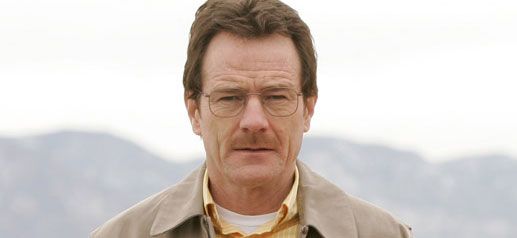
.jpg)
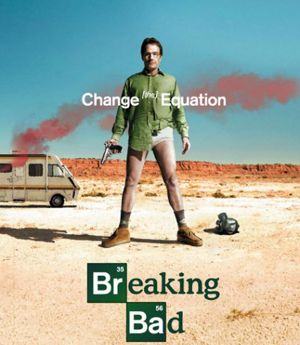
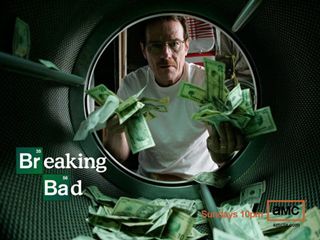
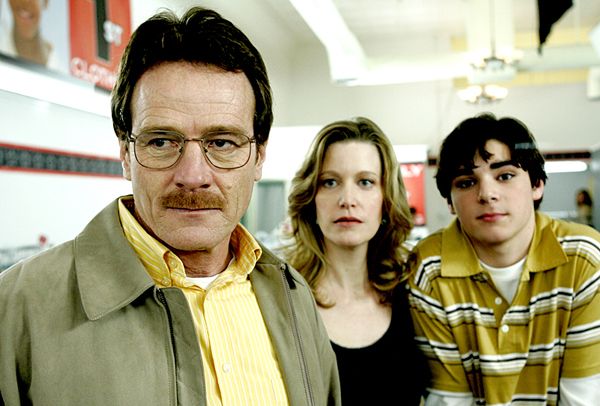
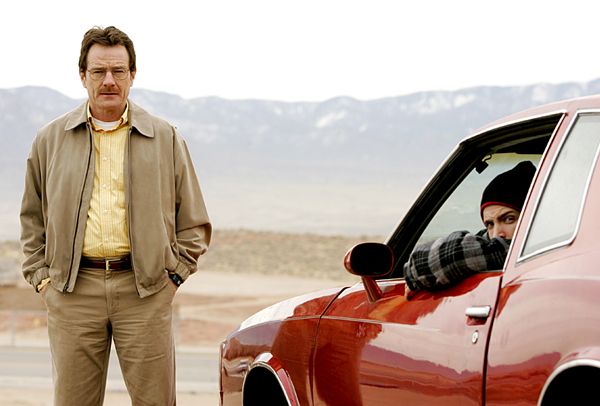
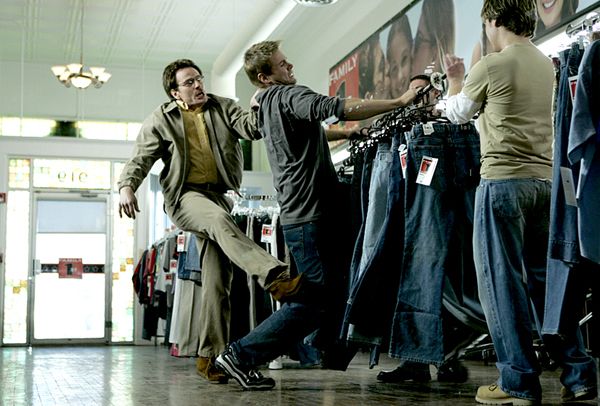
.jpg)
.jpg)
